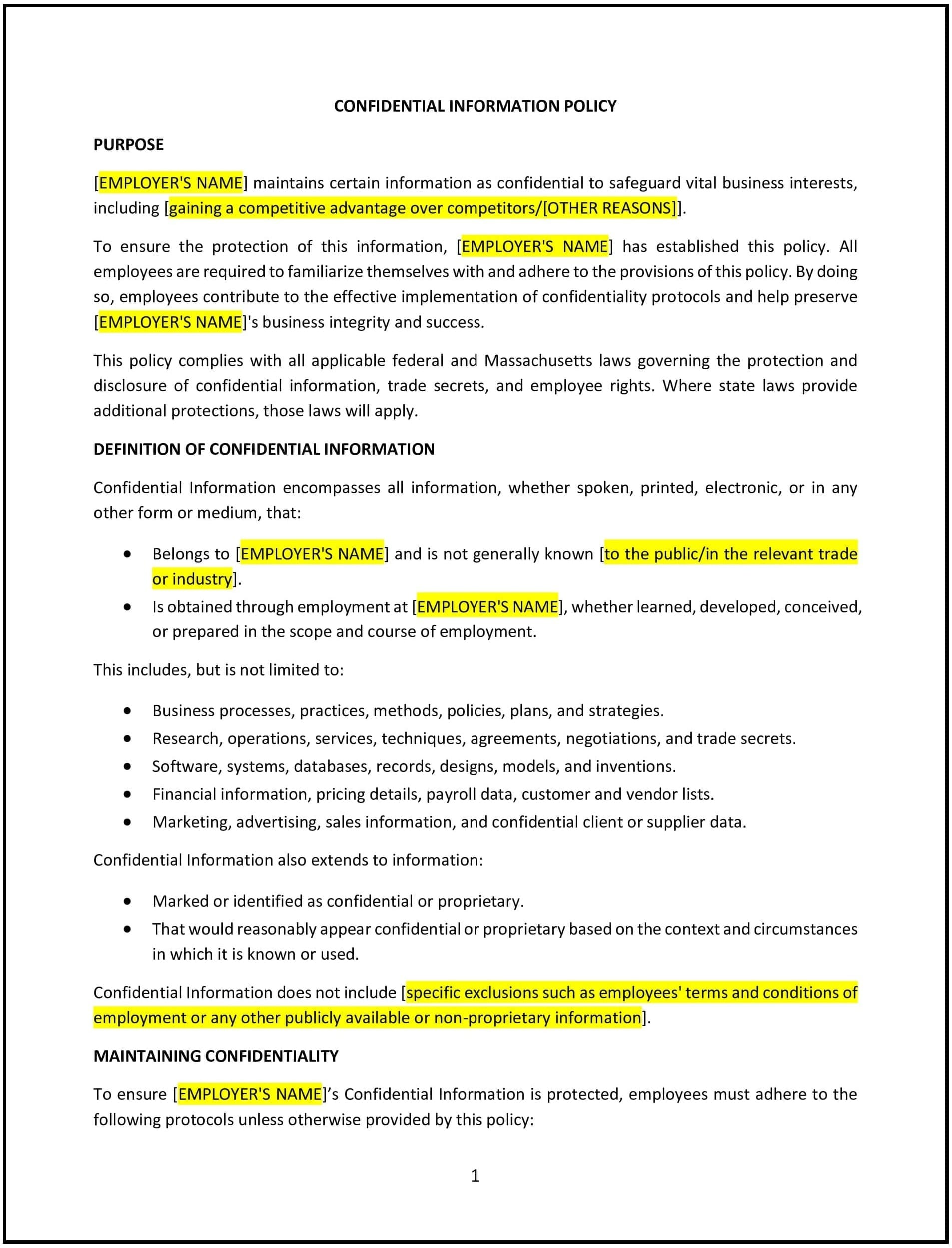Confidential information policy (Massachusetts): Free template
Got contracts to review? While you're here for policies, let Cobrief make contract review effortless—start your free review now.

Customize this template for free
This confidential information policy is designed to help Massachusetts businesses protect sensitive and proprietary information from unauthorized disclosure or misuse. The policy outlines the company’s approach to managing confidential information, the responsibilities of employees in safeguarding this information, and the procedures for handling breaches or violations. The policy is crucial for maintaining the integrity of company data and complying with relevant Massachusetts state laws and federal regulations.
By adopting this policy, businesses can reduce the risk of data breaches, enhance security practices, and ensure that employees understand their role in protecting the company’s confidential information.
How to use this confidential information policy (Massachusetts)
- Define confidential information: Clearly specify what constitutes confidential information within the company. This may include trade secrets, intellectual property, client data, financial records, business strategies, and employee records. The policy should outline which types of information are considered confidential and how they should be handled.
- Establish handling procedures: Provide clear instructions on how employees should handle confidential information. This may include guidelines for storing, transmitting, and accessing sensitive data. The policy should specify when and how confidential information should be shared and with whom, and the precautions employees should take to protect it (e.g., using encrypted email, locked file cabinets).
- Specify employee responsibilities: Outline the responsibilities of employees to protect confidential information, including securing physical and digital records, limiting access to authorized personnel only, and not discussing sensitive information in public or unsecured settings.
- Address disclosure restrictions: Define under what circumstances confidential information can be disclosed, such as when required by law or with prior written consent from the company. The policy should clarify that employees are prohibited from disclosing confidential information to external parties without proper authorization.
- Set guidelines for post-employment confidentiality: Specify that the confidentiality obligations extend beyond the employee's employment with the company. This includes restrictions on using or sharing confidential information after leaving the company.
- Outline procedures for reporting breaches: Establish a clear process for reporting breaches of confidential information, whether accidental or intentional. Employees should know how to report any suspected violations and what steps the company will take to investigate and address breaches.
- Ensure compliance with Massachusetts and federal laws: Ensure the policy aligns with Massachusetts state laws, such as the Massachusetts Data Privacy Law, and federal regulations, including those governing the protection of personal data and intellectual property.
Benefits of using this confidential information policy (Massachusetts)
This policy offers several benefits for Massachusetts businesses:
- Protects sensitive information: The policy helps safeguard sensitive and proprietary data from unauthorized access, ensuring that business operations are not disrupted by breaches or leaks.
- Reduces legal risks: By ensuring employees handle confidential information properly and report breaches, the policy helps businesses avoid potential legal and financial consequences arising from unauthorized disclosure or data loss.
- Enhances trust with clients and partners: Businesses that take data security seriously build trust with clients, customers, and partners, showing that they value the confidentiality and privacy of sensitive information.
- Promotes a culture of responsibility: A clear policy encourages employees to take responsibility for protecting company information and fosters a culture of awareness around data security.
- Improves compliance with legal requirements: The policy helps ensure that businesses comply with Massachusetts state laws and federal regulations related to data protection, privacy, and intellectual property, reducing the risk of legal penalties.
- Improves overall security posture: By setting guidelines for handling confidential information, the policy contributes to an overall security strategy, helping businesses strengthen their defenses against data breaches and cyber threats.
Tips for using this confidential information policy (Massachusetts)
- Communicate the policy clearly: Ensure that all employees are aware of the company’s confidential information policy and understand their responsibilities in protecting sensitive data. This can be communicated during onboarding and through regular training sessions.
- Provide training on data protection: Offer training to employees on best practices for safeguarding confidential information, including recognizing phishing attempts, securing devices, and using encryption tools.
- Implement access controls: Limit access to confidential information to only those employees who need it to perform their job functions. Regularly review access permissions to ensure they are up to date.
- Monitor compliance: Regularly audit the handling of confidential information to ensure that employees are following the policy and that data security measures are being adhered to.
- Respond to breaches promptly: Establish a clear and effective response plan for addressing any breaches or violations of the policy. This should include investigating the breach, notifying affected parties, and taking corrective actions to prevent future occurrences.
- Review and update regularly: Periodically review and update the policy to ensure it is compliant with Massachusetts state laws, federal regulations, and the company’s evolving data protection needs.